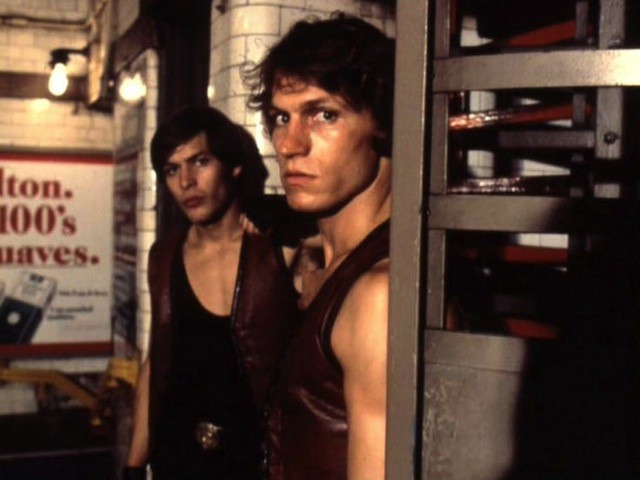Lean Men In Leather Vests
by Alexandra Molotkow

Cast members of The Warriors are meeting up in Coney Island this weekend, for a big reunion event featuring autograph sessions and cos play. I dunno about that, I’d rather leave artifacts under glass, but I appreciate the excuse to read histories of The Warriors.
Some movies are Tremendous Works of Art wrung agonizingly from their makers, and others are great for their vitality, because the people involved so clearly enjoyed themselves. As Jackson Connor wrote in this week’s Village Voice, the shoot seemed to function like a video game:
In the late Seventies, Paramount was notorious for being one of the toughest Hollywood studios to work for; they wanted their films made fast and cheap. To be a Warrior would mean running all night, every night, through the sweltering summer streets of Brooklyn, Manhattan, Queens, and the Bronx. It would mean showing up for work at six in the evening and not wrapping until the crew could see the sun rise over the East River. It would mean hopping subway turnstiles and enduring the taunts of the local street gangs. The line separating art and life would become blurred, the making of the film an adventure in and of itself.
“It was like being the center of the universe,” James Remar, who played Ajax, told The Fader for their excellent 2005 oral history of the film. “A group of young, untried actors being given the run of the city from sundown to sun up.”
The Warriors was directed by Walter Hill, and based on a 1965 novel by Sol Yurick, itself based on Xenophon’s Anabasis. After Yurick’s death in 2013, Slate wrote:
Today, Walter Hill’s adaptation of The Warriors is remembered as a cult classic, and is rightly appreciated for its visual flair and camp value more than for its historical accuracy. But when Yurick set out to write his novel about the street gangs of the Bronx, he was aiming for something more than a wildly caricatured action romp. The son of communists and union activists, Yurick was intensely interested in using literature to cast a light on the impoverished lives of New York City’s neglected youth. In an obituary for the Guardian, Eric Homberger describes the extraordinary lengths Yurick went to in researching his novel.
Yurick told Fader, “It’s not my best book. I wrote it as a kind of a joke. It took me three weeks to write.”
As a historical document, of course, the film is iffy at best — its makers didn’t create so much as partake in a myth — but chemistry makes it. “Quite early on we gelled as a gang, on the set and in life,” Michael Beck, aka Swan, told Fader. “Not that we were doing a method thing of living our characters, but I became the defacto leader. They naturally followed me because that was what was happening in the movie. We grew very close to each other.”
Thomas Waites, aka Fox, said, “it’s a business of temporary intimacy. You really create a little family. I have a lot of fond memories and strong recollections of brotherhood that I experienced with the other guys on the shoot.” His character, if you recall, gets run over by a train early enough in the film, which wasn’t supposed to happen: Waites, not Beck, was supposed to star, but he was too difficult (stoned, belligerent) for director Walter Hill, who insisted he be killed off. Waites says he’s never stopped regretting his behavior, but I personally am not complaining, because Swan is really dashing.
True Romance director Tony Scott was supposed to direct a remake, but he died in 2012. It’s bound to happen sometime, and while I hate the idea of crushing up a perfect little lozenge of the past, the Fader interviews point to certain issues a remake could address:
[Joel] Weiss: There was a gang called the Dingoes and in that gang were Kevin Bacon and John Snyder who plays the gas station attendant. The Dingoes were supposed to be a gay gang with Doberman Pinchers and blonde wigs. They were supposed to capture Michael Beck’s character.
Crucial omission. And:
Yurick: In the book there is practically nobody in there who is white.
Hill: Paramount wasn’t too high on the idea of an all black cast, as they explained, for commercial reasons.
As always, it would be nice to see more actors of color playing characters of color.